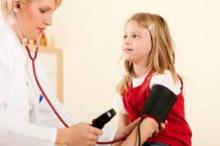The U.S. Preventive Services Task Force has determined, for the second time in 10 years, that there is not enough quality evidence to recommend – or not recommend – regular blood pressure screening as part of standard pediatric care.
The task force, chaired by Dr. Virginia A. Moyer, argues that the evidence to support routine screening for primary hypertension remains insufficient in a paper published online Oct. 7 in Pediatrics (2013;132:1-8 [doi:10.1542/peds.2013-2864]). The task force’s position on pediatric screening is little changed from 2003 when it issued recommendations on screening for both children and adults (Am. Fam. Physician 2003;68:2019-22).
For its newest recommendation, however, the task force authors looked solely at the issue of screening in asymptomatic children and adolescents without a risk factor for hypertension, such as high body mass index.
It evaluated studies on diagnostic accuracy, the relationship of childhood primary hypertension with adult hypertension and cardiovascular disease, the effectiveness of treatment, and the harms related to screening or treatment. But the task force determined that it had not found enough quality evidence to weigh in.
One of the rationales for regular blood pressure screening in asymptomatic children 3 years and older – a practice that has been recommended for more than 35 years (Pediatrics 1977;59(suppl.):797-820)and is currently advocated by the American Academy of Pediatrics, the American Heart Association, and the National Heart, Lung, and Blood Institute – is to identify children at increased risk for adult hypertension and cardiovascular disease.
However, predictive values of childhood hypertension for adult hypertension "are at best modest," wrote the authors. A recent, related study also conducted by the task force found no direct evidence that screening for hypertension in children and adolescents reduces adverse cardiovascular outcomes in adults (Pediatrics 2013;131:490-525).
Some practitioners have criticized the USPSTF’s focus on primary hypertension and adult outcomes, saying that pediatricians have other reasons to screen children routinely for hypertension, including identifying asymptomatic secondary hypertension. Indeed, for some pediatricians, reducing adult cardiovascular events is not seen as the primary goal of screening. Dr. Bonita Falkner, then incoming chair of the International Pediatric Hypertension Association, clearly outlined this position in a letter to the editor published in Pediatrics in March 2013 in response to a review conducted for the USPSTF.
The task force emphasized that "clinical decisions involve more considerations than evidence alone," and noted that screening between the ages of 3 and 17 years is recommended by the AAP and other organizations.
Dr. Sarah de Ferranti, the director of the preventive cardiology clinic at Boston Children’s Hospital and a member of the AAP committee on nutrition, said in an interview that she, like the task force authors, would like to see more evidence on the relationship between childhood and adult hypertension, and that she would not dismiss the important question of risk or harms related to screening.
But she also said she had no intention of abandoning routine screening as part of her practice, and would counsel other pediatricians not to do so, either. "There are definitely patients identified as having other medical problems by blood pressure – such as kidney problems and endocrine problems. There are cases where the blood pressure is the identifying cause," she said.
"We still identify children with primary and secondary hypertension, and that is important in terms of outcomes," Dr. de Ferranti continued. Observational and longitudinal studies, she pointed out, have found evidence linking pediatric hypertension with adult arterial stiffness, subclinical atherosclerosis, and carotid intima-media thickness, and even with cardiovascular damage that occurs before adulthood.
Moreover, Dr. de Ferranti said, there are logistical barriers to obtaining the type of evidence the USPSTF seeks in its recommendations, such as a randomized controlled trial to determine whether blood pressure reduction improves adult outcomes. "Few parents would be interested in having their child take a placebo or dummy pill for 30 years to find out the answers to these questions," she said.


